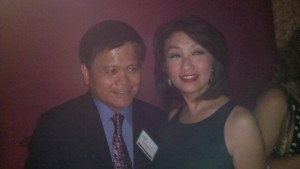
I wasn’t stopped nor frisked in NYC. Nor did I see Connie. I did see a lot of young Asian American journalists, which is good, but it seemed much of the meeting was driven by new media, tech, and gadgetry. Journalism? Well, there was some discussion of that, but for the most part it was secondary, because journalism is being transformed by the digital world. The conference almost presumes the 5w’s part. The digital stuff was much bigger at this conference than I ever expected. Which is great, because most of the attendees weren’t around when newsrooms used typewriters.
One other thing. Much has been made about the media criticism discussion at the conference. I skipped it because as much as AAJA wants to be a media watchdog, at best the group is ineffective because there are limits to what journalism associations can do. It can advocate diversity in hiring and coverage. And that’s it. It can criticize, but it doesn’t want to be seen as an advocate nor as a hard “civil rights” organization. That makes AAJA more of a “soft” civil rights org because it does preach diversity. But it truly leaves its fangs at the door. How can you be tough on big corporate news organizations when you depend on those same news organization for support? The convention was in New York, and it just seemed to lack the kind of spark you’d expect from a convention in the media capital. Media companies were pretty minimal in their involvement. Sign of the times, I’m afraid.
So roll it all up, and you have a nice careerist organization that H.R. departments love because it helps show media organizations are interested in the public good. But when the industry is shrinking and careers are curtailed or shorten, a careerist organization isn’t left with much to crow about these days. And when it crows about racist coverage, what’s it’s solution? It’s not a union. It’s a journalism organization. Aside checking for grammar and proper use of AP style, what’s left? Advocating for minority jobs? What jobs?
In the end, it was a nice gathering for some of us who still believe there’s a reason for AAJA.
Would have been nice to see one plenary session where everyone could come together and discuss the broad themes that should be concerning minority journalists and communities they cover. That would have been a place to discuss and reinforce the values of the organization.
Right now, the organization seems like it’s just trying to survive. Just like many newsrooms in the country.
